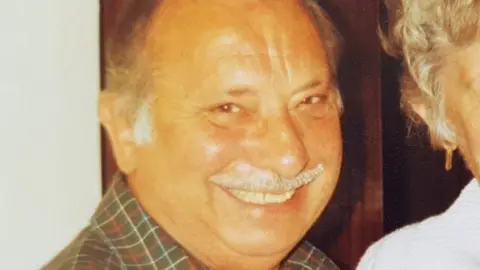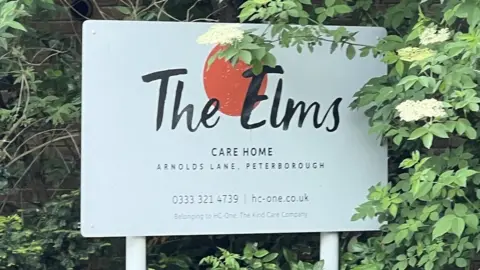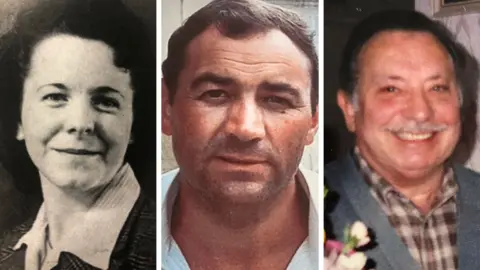The Elms: CQC apologises to family in care home death case
 Family photo
Family photoThe care regulator has apologised "unreservedly" to the family of a 90-year-old care home resident who died for not following its own procedures.
George Lowlett was one of three people who lived at The Elms in Whittlesey, Cambridgeshire, to die within weeks of each other in 2019.
An expert told an inquest there were "missed opportunities" in his case.
The Care Quality Commission (CQC) admitted it had not looked at whether there had been "avoidable harm".
The home, run by the UK's biggest care provider HC-One, closed down last year and was labelled as "not safe".
 Steve Hubbard/BBC
Steve Hubbard/BBCMr Lowlett's inquest is the second of the three residents' hearings to be heard at Peterborough Town Hall this week, after coroner Caroline Jones found "shortcomings" following Margaret Canham's death.
On Wednesday, Dr Jane Douglas, who was asked to prepare an expert report for the coroner, said there were "soft signs" of deterioration in Mr Lowlett, who had dementia and a chest infection.
She believed there were "missed opportunities to respond and react", but concluded it was not possible to say earlier intervention would have resulted in a different outcome.
She questioned whether the record keeping was a "true reflection", adding there was a "gap" in the records between the night of Sunday, 17 and Monday, 18 February, so "we don't know how he was presenting during the night".
He was taken to Peterborough City Hospital on 18 February, where he died that day.
On Tuesday, a statement by Mr Lowlett's daughter Laura Newell was read to the court, in which she said: "I believe the home's inaction resulted in my dad's death that weekend."
The inquest heard that Cambridgeshire County Council has placed an ongoing embargo upon HC-One, preventing referrals to their three remaining homes in the area.
Leesa Murray, from the council, told the inquest its concerns "related to a failure to sustain improvements" and that the authority now had "significant oversight" of those three homes.
 Family photo
Family photoHazel Roberts, the CQC's deputy director of operations for the east of England, said the regulator had powers to prosecute under the Health and Social Care Act 2008.
According to the CQC, regulation 12 of the Act is intended to prevent people from receiving unsafe care and treatment and prevent avoidable harm or risk of harm.
She said in Mr Lowlett's case an initial assessment may not have been completed by CQC inspectors as expected and by the time this was brought to its attention, it was out of the three-year time limit to prosecute.
Ms Roberts said she wanted to "unreservedly apologise" to the family.
"My apologies that our procedures weren't followed in this case," she said, but she agreed with the coroner that she could not say the case would have moved forward to a prosecution.
The inquest continues.

Find BBC News: East of England on Facebook, Instagram and Twitter. If you have a story suggestion email [email protected]
